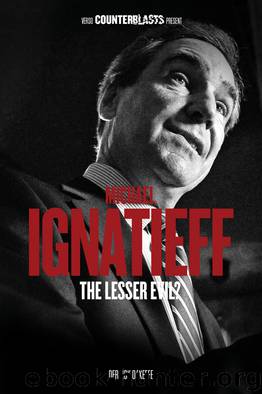Michael Ignatieff by Derrick O'Keefe

Author:Derrick O'Keefe
Language: eng
Format: epub
Publisher: Verso Books
Published: 2014-06-03T04:00:00+00:00
In a published letter to the editor, Ignatieff responded by claiming that Lapham had “[mistaken] description for endorsement,” adding that “no imperial power can withstand the power of modern nationalism, the desire of people to free themselves from foreign interference.”12 However, even the most cursory of inspections of Empire Lite and Ignatieff’s other subsequent writing on Iraq and empire makes a mockery of the assertion that he was misunderstood.
His high-profile support for the war certainly angered many colleagues, and his support for encroachments on civil liberties in the name of the war on terror only made things worse. His book The Lesser Evil came out in 2004, the same year that the horrific images from Abu Ghraib prison were circulated all over the world. In a speech in late 2004, Ignatieff made an astounding assertion about the torture scandal in Iraq, effectively blaming the victims: “the terrorists are controlling the escalation gradient: provoking US interrogators into the abuses at Abu Ghraib, drawing them into cities like Najaf and Falluja.”13 Ignatieff offered no evidence that suggested the victims of US torture and abuse in Iraq had “provoked” the occupiers, and this particular claim was not repeated.
In The Lesser Evil, Ignatieff considers how the liberal democracies should respond to terrorism. He provides some substantial, and useful, sketches of how societies from Britain to Sri Lanka have responded to political terrorism. Superficially, his argument is for prudent, minimalist state responses to terror. What might otherwise have been a nuanced and usefully cautionary study, however, is distorted by Ignatieff’s identification with imperialism. This leads him to blur his categories of lesser (liberal democracy) and greater evils (“nihilistic” terrorism) into the usual tropes justifying western domination and neo-colonialism, eliding altogether the key point that empire and terrorism are often symbiotic processes. The failure of lesser nations and peoples, Ignatieff asserts, is nothing whatsoever to do with the greatness of the most powerful liberal democracies: “our success is not a fact to feel guilty about, and the failure of other societies is not our fault” (LE, p. 168).
So it is that what seems to be a prescription for reason and restraint blurs into a defense of the most irrational and unrestrained foreign policy. Ignatieff, at points, writes about “Evil” the way George W. Bush speaks about it: “free peoples used to living at peace have difficulty admitting that they are actually faced with evil” (LE, p. 167). Once again, Ignatieff seems to be trying to rouse his complacent fellow liberals to arms.
The Lesser Evil disavows torture, but with a caveat allowing for all kinds of abusive actions that could well be called torture. After advocating “an outright ban on torture,” Ignatieff asserts that legislation is needed to “define acceptable degrees of coercive interrogation.” “Permissible duress might include forms of sleep deprivation that do not result in lasting harm to mental or physical health, together with disinformation and disorientation (like keeping prisoners in hoods) that would produce stress.”14 This line of argument led to sharp denunciations. Laurie
Download
This site does not store any files on its server. We only index and link to content provided by other sites. Please contact the content providers to delete copyright contents if any and email us, we'll remove relevant links or contents immediately.
Waking Up in Heaven: A True Story of Brokenness, Heaven, and Life Again by McVea Crystal & Tresniowski Alex(37014)
Still Foolin’ ’Em by Billy Crystal(35548)
Cecilia; Or, Memoirs of an Heiress — Volume 1 by Fanny Burney(31348)
Cecilia; Or, Memoirs of an Heiress — Volume 3 by Fanny Burney(30946)
Cecilia; Or, Memoirs of an Heiress — Volume 2 by Fanny Burney(30905)
Fanny Burney by Claire Harman(25790)
Empire of the Sikhs by Patwant Singh(22183)
We're Going to Need More Wine by Gabrielle Union(18081)
Hans Sturm: A Soldier's Odyssey on the Eastern Front by Gordon Williamson(16733)
Plagued by Fire by Paul Hendrickson(16641)
Out of India by Michael Foss(16313)
Cat's cradle by Kurt Vonnegut(13889)
Molly's Game by Molly Bloom(13362)
Bombshells: Glamour Girls of a Lifetime by Sullivan Steve(13117)
Pimp by Iceberg Slim(12940)
All the Missing Girls by Megan Miranda(12769)
Leonardo da Vinci by Walter Isaacson(11914)
4 3 2 1: A Novel by Paul Auster(11071)
The Radium Girls by Kate Moore(10914)
